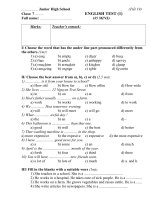i full name i put each verb in brackets into the suitable tense 1 by the time we reach home the rain stop 2 this time next week i lie on the beach in spain 3 in ten years’ time i work for a dif
Bạn đang xem bản rút gọn của tài liệu. Xem và tải ngay bản đầy đủ của tài liệu tại đây (46.97 KB, 1 trang )
<span class='text_page_counter'>(1)</span><div class='page_container' data-page=1>
<b>Full name:...</b>
<b>I. Put each verb in brackets into the suitable tense:</b>
1. By the time we reach home, the rain (stop)
2. This time next week I (lie) on the beach in Spain
3. In ten years’ time I (work) for a different company
4. If we don’t get there by six, Jack (leave)
5. Now is June, and In November they (be) married for twenty years
6. In the year 2500 a lot of people (live) on the moon
7. When you get to the station this afternoon, I (wait) for you outside
8. Don’t worry! The plane (land) in a moment
9. By the time you come back home, I (finish) the decorating
10.Come round between eight and nine. We (watch) TV then
<b>II. Put each verb in brackets into the suitable tense:</b>
<b>Have you ever wondered what exactly (you do) in ten years’ time? Well, according to computer expert Tom</b>
<b>Vincent, computers (soon be) able to make accurate predictions about the future. Professor Vincent from</b>
<b>Cambridge University, (hold) a press conference next week to describe the computer which he calls</b>
<b>“Computafuture”. “This computer can tell us what life (be) like, based on the data describing past events,” explains</b>
<b>Professor Vincent. For example, Computafuture can predict how many people (live) in a particular area, or whether</b>
<b>there (be) a lot of rain during a particular period. Professor Vincent also believes that by the year 2050, computers</b>
<b>(replace) teachers, and (also do) most of the jobs now being done by the police. “Computers are becoming more</b>
<b>intelligent all the time,” says Professor Vincent. “Soon they (direct) traffic and (teach), and telling us about the</b>
future”
<b>III. Put each verb in brackets into the suitable future tense:</b>
1. When I (see) you tomorrow, I (tell) you my news
2. As soon as we (get) there tomorrow, we (phone) for a taxi
3. I (go) to the library before I (do) some shopping tomorrow
4. We (wait) here until the rain (stop)
5. We (get) some money from the bank when it (open)
6. After you (take) this medicine, You (feel) better
7. You have to stay until you (finish) your work
8. I (let) you know the minute I (hear) the results
9. Before we (paint) this wall, we (have) a cup of tea
10.We (climb) over the wall as soon as it (get) dark
<b>IV. Choose the best answer for each sentence:</b>
1. Don’t phone me between 8.00 and 9.00. I ...then
A. will be studying B. am studying C. will study D. study
2. Look out! That tree ...
A. will fall B. is going to fall C. has fallen D. falls
3. Can you call me at 7.00, because I...tomorrow
A. am leaving B. will leave C. will have left D. will be leaving
4. I can’t see you on Thursday afternoon. I ...our branch in Birmingham
A. was visiting B. visited C. will be visiting D. will be visited
5. George...back until six. Can I take a message
A. won’t be B. wasn’t C. hasn’t been D. will be
6. I don’t think you ....any problems at the airport
A. will be having B. will have had C. have met D. will have
7. All the hotels are full. Where...the night?
A. will we be spending B. will we have spent C. are we going to spend D. did we spend
8. You’d better not come in November. My mother ...with me then
A. will have stayed B. is staying C.. will be staying D. stays
9. Let me know as soon as Louise ...here tomorrow
A. gets B. will get C. is getting D. will have got
10.Can you answer the phone for me? I... down for a while
A. lie B. have lain C. am going to lie D. will be lying
<b>V. Correct the following mistakes for the following passage</b>
</div>
<!--links-->









